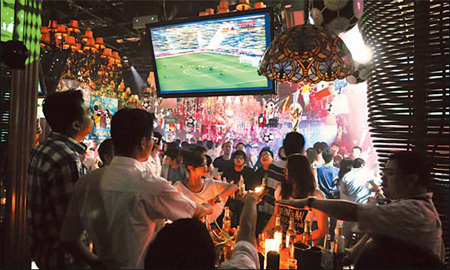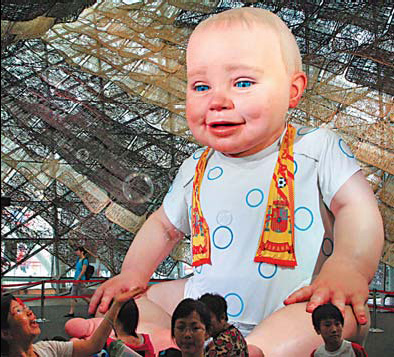
Although no figures are available for the total commercial spending on this year's tournament, Huang Shengmin, dean of the Communication University of China's advertising department, said promotion during the World Cup is far more valuable than during the Olympic Games or annual Spring Festival Gala, two of the most popular events on Chinese television.
"The World Cup is like a TV series," he said. "Audiences keep a close eye on every episode as each one is crucial to the final result. By the time the final comes along, the viewers' excitement has reached fever pitch.
"Intensive advertising during the tournament is highly effective," he added, "because audiences transfer that enthusiasm from the games to the products and brands they see during the advertisement breaks."
Chen at Interbrand agreed but added: "Marketing is complex. When you have made your target groups recognize your company name, you must make great efforts to explore ways of transmitting the core philosophy of your brand."
The most successful international brands "cleverly connect their core philosophy with the event they sponsor and have all-round marketing packages", he said. "Chinese enterprises should learn from their rivals."
Viral videos
Websites have also been put to the test over the last month, with several attracting millions of viewers with on-demand World Cup services and interactive programs using video streamed by the State-owned China Network Television (a division of CCTV), which has an exclusive deal with FIFA.
"The demand for the World Cup has been unprecedented," said Chen Feng, vice-president of ku6.com, one of China's largest video-sharing websites. "Even after the World Cup, we're still getting companies coming to us to place advertisements."
He said his company's advertising revenue had "outstripped" the cost of buying the World Cup games, which was more than 10 million yuan, but he refused to give a specific figure.
|

Soccer fans watch a World Cup game at a bar in Fuzhou, capital of Fujian province. Zhang Bin / for China Daily
|
CNTV, a latecomer in the online video market, ranked first for online advertising during the tournament, followed by ku6.com, youku.com and pptv.com, said a report by Analysys International.
"After the Olympic Games, both portals and video websites have a much better grasp of presenting big events, which contribute a lot to their revenue growth," said Li Zhi, an analyst with Analysys International.
Sina.com, the country's largest news website, also attracted more than 50 advertisers in the last 30 days, according to its chief operations officer, Du Hong.
Edward Yu, president of research firm Analysys International, recently estimated the deals could net Sina as much as 80 million yuan. "Internet advertising is now a leading force in a company's marketing (strategy) for the World Cup," he told Beijing TV. "In the past, it was just a foil."
Du added that during the quarterfinal between Argentina and Germany Sina's microblogging service was bombarded with more than 3,000 posts a second.
Website revenues from the World Cup are estimated to hit 700 million yuan, roughly 3.5 percent of the amount generated by Internet advertising last year, according to research by the Data Center of China Internet.
|

Fans put a scarf on a robot baby at the Spanish pavilion. Pan Suofei / China News Service
|
More cover stories

